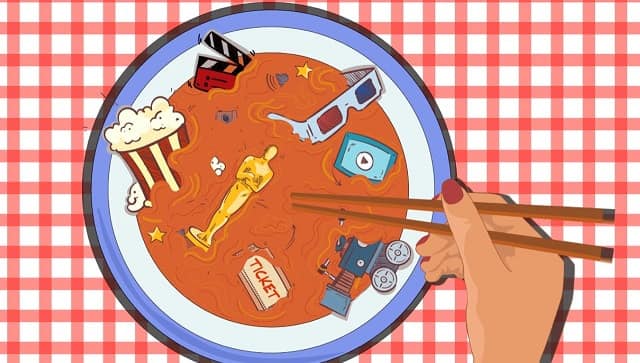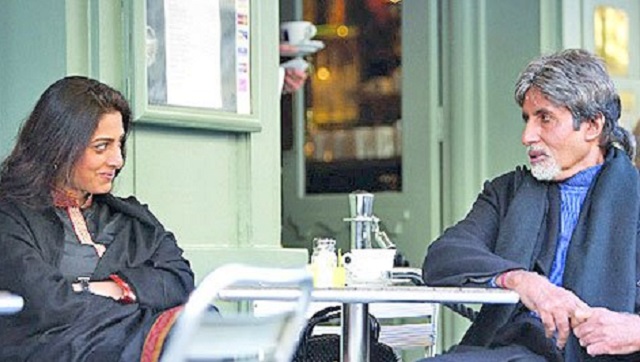“Good food is like music you can taste, colour you can smell.” Ratatouille gets us. In this series ‘Food for Film,’ we pick food films/shows that make our mouths water and our souls richer. * “Cheeni coffee ka taste barbaad kar deti hai.” “Mujhe cheeni pasand hai.” “Toh aapko coffee pasand nahi?” This exchange of Amitabh Bachchan’s Buddha and Tabu’s Neena in R Balki’s Cheeni Kum [2006] is my go-to reference for whenever someone asks me why I don’t add sugar to my coffee. But for Buddha, not adding sugar to his cuppa isn’t just a preference. It’s a lifestyle choice — to not dilute the bitterness within. Bachchan’s character is introduced as a chef, as he preaches how cooking is a kala, an art form, which demands involvement of all senses. That’s rather rich coming from a man so bitter, so acerbic that Neena is taken aback when she learns his name, ironically yet again, is Buddha. But the acerbity also stems from the path of abstinence Buddha has chosen for himself. While Lord Buddha attained nirvana in the process, the lesser Buddha has channeled all the sexual tension into acrimony. It’s no coincidence that he is treated to karelas [with taunts on side] every time he returns home to his tangy nonagenarian mother [Zohra Sehgal]. Until one day, Neena visits her restaurant and gives him a sweet lesson. When Buddha finds out through a waiter that the Hyderabadi Zafrani pulao has been returned to the kitchen because she complains it’s sweet, Buddha goes to her table and tells her rather pungently that she has never stepped into the kitchen so shouldn’t make a fuss.

But Tabu’s character here is not your typical manic pixie dream girl. She’s not as candy-coated or saccharine.
Though she injects sweetness into his life to dilute the bitter, she does so with the right amount of namak. Her knowing eyes and shrewd smiles are a perfect counter to Buddha’s saltiness.
Music composer Illayaraja’s winky music helps turn Shreya Ghoshal’s honeyed voice into something profoundly sweet-and-sour. Even when Neena and Buddha progressively fall in love, they find themselves on the opposite ends of the spectrum. She is religiously inclined towards non-vegetarianism while he has only tasted meat once despite serving all kinds of dishes in his restaurants. The sweet and the bitter, the 34-year-old and the 64-year-old, become tangdi kebab and ghaans phoos as their relationship evolves. But the politics of age and food choices aside, what really makes the opposites attract is the subconscious desire to have a taste of each other’s personalities. While Neena’s sweet doses make Buddha reactivate his thirst, Buddha’s bitterness rubs off on Neena when she tells her father [Paresh Rawal] disapproving of their age-gap-stricken relationship, “Maa toh aap se chhoti thi, wo gayi na aapse pehle.” Cheeni Kum is a food film beyond these mood boards defined by taste. There are chefs buzzing in a New York restaurant, philosophical musings over orange lollies, murmurs of Delhi chatwalas at railway stations, ageist barbs through ginger tea, Nizamuddin’s chicken as truce, a Gandhian eating meat and then committing fast unto death after releasing “too much soda” from his body post a whiskey session. Also, not to forget his bunch of friends using his stomach as serving table for tea and biscuits as he reluctantly yet stubbornly continues his fast. The film thus uses food to make a larger point about how dieting/fasting to massage your ego won’t starve the world, but only oneself. Similarly, to not give love a chance, to abstain from some much-needed sugar as antidote to one’s acquired bitterness, will only make one even more embittered. Until someone sweet-spice-and-everything nice enters, turns around, and makes the world a hungrier place. Read more from the series
here . [caption id=“attachment_10273431” align=“alignnone” width=“640”]
 Food for Film. Illustration by Poorti Purohit[/caption] Read all the
Latest News ,
Trending News ,
Cricket News ,
Bollywood News , India News and
Entertainment News here. Follow us on
Facebook,
Twitter and
Instagram.


)
)
)
)
)
)
)
)
)



